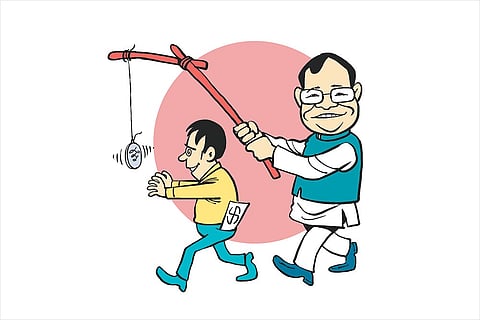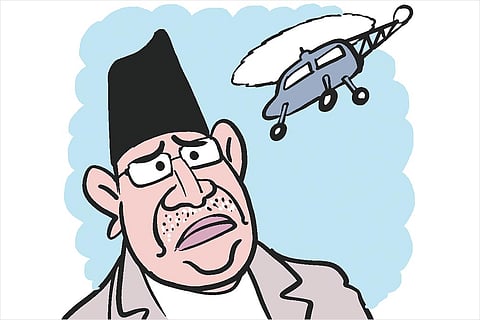BEST Porta-Potty
The Subcontinental Menu
From BMC's proposal to convert at least 10 old BEST buses into mobile loos to an Arunachal lawmaker accused of casting a voodoo spell on voters, read this and much more in this week's The Subcontinental Menu.
An irritable bowel, or an overfull bladder, is the pressing reminder of the Mumbai lowlife—the dream city’s unstoppable traffic jams, layovers of nearly an hour at bus-stops, and the absence of public toilets. That explains the stinky, yellowish wet walls by the sidewalks. The Brihanmumbai Municipal Corporation has a solution, which is more like a prescription pill that blocks the causes of the discomfort but never really is the cure. The BMC has proposed converting at least 10 old BEST buses—those red icons of a hot, bumpy, crowded, noisy ride—into mobile loos and station them at snarl hotspots. The plan, the BMC hopes, will bring money to the cash-strapped BEST, save a few retiring buses from the boneyard and, more than anything in the world, stop the commuter from soiling the walls or holding their pee.

Bring Back The Bling
In a city where the anthem is money, money, money, the Sensex and Bollywood belong to the same stock and sing the same sacred song. It came as no surprise that Apna time aayega (our time will come)—the title tune of Ranbir Singh’s Gully Boy—is now being sung more lustily and with brass-necked hope as the Sensex kept tumbling for almost a fortnight, the longest losing streak for eight years. More than an anthem, the song has become the distress call of Mumbai stock market players, particularly the hardest-hit smaller companies, investors and brokers. And they sing with the firm belief that this hope-harbinger will not meet the fate of another national anthem that busted the charts some years ago. It was titled Achchey Din.

Sheer Saree Porn
Sanai Mahbub is a social media celebrity in the Kim Kardashian mould, with slobbering admirers upvoting the plastic in her chest. The problem is this eyeball-chasing clickbait starlet is from Bangladesh, a conservative nation where risqué is risky business—even if she is fully-clothed in her selfies and livestreams. The saree is too sheer, madam, and the pose too suggestive. And so, the first Bangladeshi celeb to own up to surgically enhanced breasts was summoned to a Dhaka police station for ‘counselling’. She was told to remove the ‘vulgar’ content. What has the boorish bureaucracy to say about this? Well, some of the 21-year-old’s images could be ‘illegal’ under pornography laws in a country that has launched a crackdown on Internet porn.

Black Magic MLA
That politicians keep their supporters spell-bound is old rag, but when a lawmaker is accused of casting a voodoo spell on voters, it is news. And that piece of news springs from a sequestered non-newsy place—Longding, in Arunachal Pradesh, whose legislator Thangwang Wangham is facing hard questions from members of his Wancho tribe. They allege that Wangham had placed hoodoo amulets to charm voters and win the 2014 assembly elections. The MLA dismisses the allegations as political conspiracy, but black magic is a serious charge among this animist tribe from the Naga stock that practises shamanic rituals to appease forest spirits and who were headhunters until 1991.

Oli-Copter Downdraught
The Nepal government proposed buying a presidential helicopter. Hardscrabble citizens shouted a collective ‘no’. The PM fired back: Do you expect the president to ride a bullock cart? The sarcasm wasn’t lost. As the cart and copter occupied the national discourse, singer Pashupati Sharma belted out Loot whatever you can, that’s allowed in Nepal, topping charts. But in a blaze of chintzy irony, the pop take on corruption was withdrawn abruptly from YouTube. What next? PM Oli has an ox-cartload of protests to haul. He can turn to India for some advice. We know how to fly out such turbulences.
Precious Cannonball History
History, they say, has to be dug up and displayed in a thick shell of hardened truth. In Machilipatnam’s Bandarkota, the past is shooting up periodically in people’s backyards as solid-metal cannonballs. These are unearthed in the town’s old parts, excavated for new housing, and are probably from the Dutch war inventory when they had a military station in Andhra centuries ago. Floods, pestilence and British peskiness drove the Dutch out; the earth entombed their shots. Now, the reality: most families have not disclosed their find, fearing the ASI would confiscate the ‘treasure’.
Mumbai’s Monkey In Lingerie
It’s hard to tell if Mumbai’s sex crimes dipped, men became more respectful towards women, or maniacs lost their libido in six years since the city’s civic agency outlawed shop mannequins in lingerie on the insistence of a counsellor who swore that such displays ‘aroused’ the procreative instincts of male Homo Sapiens. It took some hard knocks for Brihanmumbai Municipal Corporation to acknowledge the monkey in the underpants and take a step towards undoing the ban recently. It said Mumbai is an international city where beauty pageants and swimwear shows are par for the course and, hence, lingerie mannequins aren’t indecent. But where did the perverts go? To Ajanta and Ellora?

Strategic Absence
Pervez Musharraf, according to keen observers of Pakistan, was very good in tactics but always poor in strategy. Going by the set of excuses his advisors are putting forward to justify his delay in returning to Pakistan, one may find his detractors’ assessment about him not to be totally off the mark.
The former army ruler, wanted in Pakistan for treason, has been in self-exile since March 2016. He had been charged with abrogation of the constitution (while dismissing an elected government and grabbing power through a military coup). The Supreme Court of Pakistan wants to try him for the charges. It had issued several notices to the general, seeking his personal appearance before the court. However, Musharraf has so far failed to oblige the honourable justices.
Sitting in Dubai, Musharraf, who is also the chief of the All Pakistan Muslim League, told newsmen that he sees the “political environment” in Pakistan “favourable” for his return. However, he ruled out any immediate plans of returning to the country.
Musharraf’s breezy confidence about the political atmosphere comes from the fact that nearly 50 per cent of the people in Imran Khan’s cabinet were his associates. But it will be very unusual for him to expect the government to plead on his behalf to the apex court.
He pointed out: “Pakistan is my country. My roots are there. My relatives and friends are there. I will definitely go there.” But he will not jump like a fool and rush into what might be a perilous sojourn. It had to be planned under a proper strategy, he confided to the media.
Interestingly, a few weeks back, Musharraf’s lawyer had argued that he was suffering from amyloidosis, a rare disease that deposits broken protein in various organs of the body and makes it difficult for the person to stand and walk.
The former army ruler was being treated in London and was therefore unable to return to Pakistan, he said. However, it seemed a little strange that Musharraf could travel to all the way to the UK from the UAE but not to Pakistan.
His comments, however, have left many to wonder if he was planning to return to politics in the near future.
“Gen Musharraf has been out of power for 11 years but it seems he is still intoxicated with power,” said former Pakistani foreign minister Khawaja Asif.
Illustrations by Manjul; Text by Alka Gupta
Tags